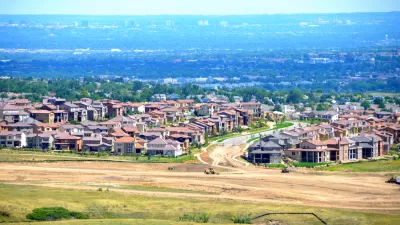Retrofitting suburbia may be a challenge in a small town with high birth rates.

Last week, I visited a very unusual college town: Lakewood, New Jersey, roughly halfway between New York and Philadelphia. Lakewood is dominated by yeshivot- academies for the study of the Talmud and other Jewish sacred texts. Most students at these academies are college-age Orthodox Jews (in particular, "yeshivish" Jews who tend to be more ritually strict than modern Orthodox Jews and less so than Hasidic Jews). Because the yeshivot have grown rapidly over the decades and the students marry early and rarely practice birth control, Lakewood is growing rapidly: its population has doubled since 1990.
Normally, growing cities full of young people have prosperous downtowns. But downtown Lakewood is just so-so: certainly stronger than many Sun Belt downtowns, but far less busy than many college towns. The downtown has a small grocery store and a smattering of Jewish-oriented businesses; many of the larger businesses have migrated to the edge of town. Compared to the Orthodox neighborhoods of Brooklyn, downtown Lakewood seems lackluster. What’s wrong here?
I talked to a few locals, and got this story: because Lakewood is not close to any big city, it has minimal public transit, and the transit that exists is designed to serve long distance commuters rather than local residents. So when the town grew, the number of cars grew, making driving and parking difficult. Much of the downtown's retail moved to suburbia where parking was easier, and many new jobs are in suburban office parks.
However, this story misses a key detail; the blocks surrounding downtown are already dominated by parking. In fact, the downtown seems to have far more "homes" for parking than for people—and yet the parking still is not convenient for many. So in Lakewood, as in many other downtowns, the attempt to build a parking-oriented downtown is not working.
So my instinctive response would be to replace the parking lots with apartment buildings and offices; if more people lived and worked within a block or two of downtown, the retail stores would have more shops, and whatever the town lost from fewer parking spaces would be made up for by increased pedestrian retail traffic.
Having said that, Lakewood is unique in one respect. A typical college town has lots of single young adults who can live in small apartments, which in turn means that a developer can cheaply build lots of apartments. But in Lakewood, 61 percent of rental households have children under 18. (By contrast, in Charlottesville, Virginia, home of the University of Virginia, only 21 percent of rental households have children under 18.) So the "retrofitting suburbia" playbook may have to be modified to fit this reality, perhaps by building apartments with more bedrooms.
In addition, some public transit to and from the edge of town might reduce demand for driving. About 13 percent of Lakewood households have no car, somewhat more than in most suburbs. And 40 percent of households have just one car—not an abnormally high number by national standards, but high for suburbia. By contrast, in nearby Howell, only 25 percent of households have fewer than two cars. So there may be latent demand for better bus service—and if the city grows up instead of out, there may eventually be enough of a population base to justify some sort of light rail.

Maui's Vacation Rental Debate Turns Ugly
Verbal attacks, misinformation campaigns and fistfights plague a high-stakes debate to convert thousands of vacation rentals into long-term housing.

Planetizen Federal Action Tracker
A weekly monitor of how Trump’s orders and actions are impacting planners and planning in America.

In Urban Planning, AI Prompting Could be the New Design Thinking
Creativity has long been key to great urban design. What if we see AI as our new creative partner?

King County Supportive Housing Program Offers Hope for Unhoused Residents
The county is taking a ‘Housing First’ approach that prioritizes getting people into housing, then offering wraparound supportive services.

Researchers Use AI to Get Clearer Picture of US Housing
Analysts are using artificial intelligence to supercharge their research by allowing them to comb through data faster. Though these AI tools can be error prone, they save time and housing researchers are optimistic about the future.

Making Shared Micromobility More Inclusive
Cities and shared mobility system operators can do more to include people with disabilities in planning and operations, per a new report.
Urban Design for Planners 1: Software Tools
This six-course series explores essential urban design concepts using open source software and equips planners with the tools they need to participate fully in the urban design process.
Planning for Universal Design
Learn the tools for implementing Universal Design in planning regulations.
planning NEXT
Appalachian Highlands Housing Partners
Mpact (founded as Rail~Volution)
City of Camden Redevelopment Agency
City of Astoria
City of Portland
City of Laramie






























